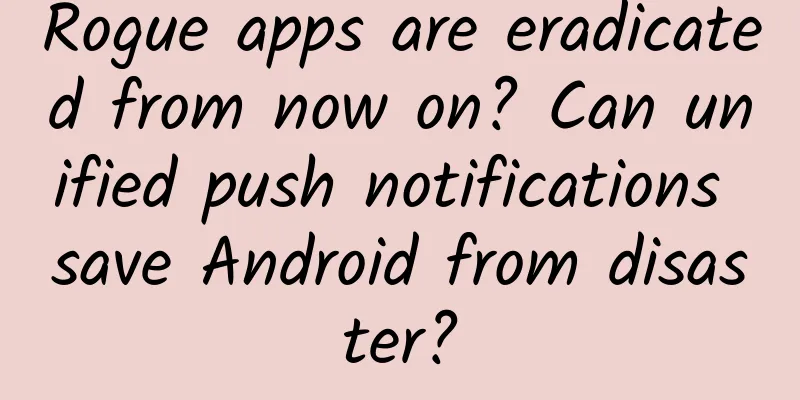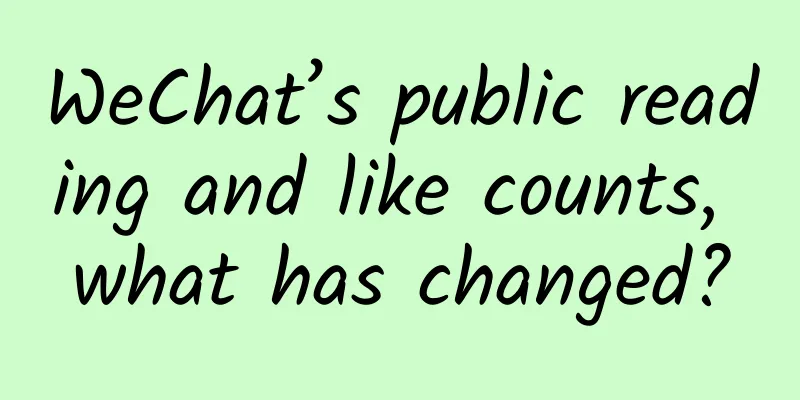Rogue apps are eradicated from now on? Can unified push notifications save Android from disaster?

|
Recently, there is a piece of news that makes Android users excited - the official website of the Android Unified Push Alliance has been launched! This means that China is likely to usher in a unified push mechanism for Android apps in the short term. Many people believe that this can solve the various chaos in the domestic Android ecosystem and can be regarded as the savior of the Android ecosystem. Why do people think so? Can unified push really eliminate the rogue phenomenon of domestic apps? Let's talk about this topic today.
Why are there so many rogue Android ecosystems in China? Before discussing, we need to first clarify how the chaos of the domestic Android ecosystem is caused. I believe most readers know how chaotic the domestic Android ecosystem is. Domestic Android apps often take various measures to stay in the background, which will greatly increase the power consumption of the device and easily cause lags and heat. The reputation of the Android system being unsmooth is largely due to these domestic apps. In addition, another chaos in the domestic Android ecosystem is the random application of permissions. In front of rogue apps, user privacy is completely gone.
Why did it become like this? The first time we used the world's best mobile operating system, and the first time we welcomed the flourishing domestic apps, the two technological trends overlapped, which should have brought a better user experience. The dreamlike mobile Internet era seemed to be within reach. However, why did it become like this? This is inseparable from the national conditions. The reason why iOS apps rarely stay in the background is partly because of system mechanism limitations and partly because iOS provides a unified message push interface. If an iOS app wants to push a message to a user, it only needs to send the message to the Apple server, which will then forward it to the user. It does not need to implement this function by keeping a process in the background. In fact, Android also has a similar mechanism. Google provides a GCM push interface, but unfortunately, it is difficult to connect to Google servers in China for various reasons, so apps must rely on themselves to implement message push. In order to push messages to users in a timely manner, Android apps need to keep processes in the background to maintain push services. However, will the processes in the background only do their job of receiving messages? With such a legitimate reason as push messages, many rogue apps actually use background processes to do other things, such as collecting other information on users' phones in conjunction with the high permissions they apply for. At the same time, both the official Android system and the modified ROM have increasingly strict background restrictions. In order to stay in the background, Android apps have adopted various tricks, such as waking up multiple processes and using Android broadcasts to start automatically. In order to deal with rogue apps, Android ROMs have evolved again; in order to bypass ROM restrictions, rogue apps have become more sophisticated... This cycle has formed a vicious cycle in the Android ecosystem. The experience of the Android system should be better than it is now. Can unified push save the Android ecosystem? How to solve the problem of chaotic Android ecosystem? Of course, we need to start with push. If you have ever made a comparison, Android apps installed from Google Play are obviously more compliant than apps released privately in China. This is mainly due to the review of Google Play and GCM push. Since GCM cannot be used in China, the unified push solution for apps has to be solved by others. In fact, many Internet companies have provided unified push services, such as Xiaomi's MiPush, Baidu and Alibaba's push API, etc. However, these push services have limited influence. For example, popular apps such as QQ and WeChat do not support MiPush; or the push solution itself has side effects. For example, the push solutions of Baidu and Alibaba are largely solved by resident background wake-up. If there is no big boss who can convince everyone to launch a push solution that everyone can participate in, I am afraid that these third-party pushes will still be a temporary solution and not a fundamental solution.
Now, the big guys have come out. The Android Unified Push Notification Alliance was initiated by the Ministry of Industry and Information Technology, and mobile phone manufacturers and Internet companies such as Huawei, OPPO, vivo, Xiaomi, Samsung, Meizu, nubia, Baidu, Alibaba, Tencent, JD.com, and Google have all participated in it. That's right, even Google has joined the alliance as an observer, and the Android Unified Push Notification Alliance has a strong official background. Thanks to the official endorsement and the active participation of manufacturers, it is very likely that in the future, the ROM of domestic Android phones will have a built-in unified push API, and Android apps will use this interface to implement message push. In this way, most apps no longer have a reason to stay in the background, and ecological improvement is just around the corner.
Of course, this unified push alliance cannot solve all problems. For example, it is not a mandatory solution. The Android system still does not require apps to push messages through a unified interface like iOS does, so if some apps still want to play rogue, it cannot be stopped. However, as mentioned earlier, ROM's restrictions on the background have become increasingly strict. Weighing the pros and cons, I believe that apps that choose unified push should still account for a large proportion.
In addition, the unified push solution cannot solve the problem of rogue apps asking for permissions randomly, after all, these are two different fields. Fortunately, the Android system has become increasingly strict in managing permissions. Both native Android and modified ROMs have the function of app permission management, which is relatively easier to solve than the chaos of background flooding. Summarize Can unified push notifications save Android from the dire situation? From the perspective of curbing rogue apps from staying in the background, it should play a role that cannot be underestimated. However, this is not a mandatory standard, and whether its influence can reach the level of GCM is still questionable. Moreover, it is being promoted domestically, and its influence on foreign apps is limited. In any case, this should be a good thing. Restricting unified push notifications in the background will hurt the interests of some people. I hope it can play a real role. |
<<: Are mobile programmers having an easy time in 2017?
Recommend
Souwai Elite Sharing Class Video Course 618 Promotion!
Souwai 618 video course: From 0 to 1 Baidu SEM bi...
Dryness alert! How can the elderly avoid the spring "desert skin" dilemma?
Skin itching is one of the most common symptoms o...
Caocao Travel Competitive Product Analysis Report
The convenient business of online ride-hailing ha...
When you have insomnia or can’t sleep, does closing your eyes and “squinting” count as resting?
The cover image of this article comes from the co...
Momo advertising promotion, what are Momo advertising resources?
For video social networking, come to Momo! Momo, ...
Operation Case | 25 perfect details, Apple after-sales service teaches us how to operate
We often come across many excellent operation cas...
If you are depressed, why can't you take antidepressants?
This is the 3722nd article of Da Yi Xiao Hu Aunt ...
Good looks are still useful! Embryo beauty contest: Embryo appearance and selection
Author: Fu Jing, Chief Physician of Shanghai Jiai...
Xiaohongshu blogger’s money-making rules!
Today, Xiaohongshu has become a "gemstone&qu...
If you don't understand, ask! Why does bread become hard as it ages, while biscuits become soft?
Bread and biscuits are small snacks that we often...
Is it contradictory to protect a certain species with protecting biodiversity?
A few days ago (May 22) was the International Day...
Event Operation: How to plan an online event?
1. What is the purpose of online activities? The ...
Xpeng Motors Wuhan factory project officially launched, accelerating the separation process with Hainan Mazda
New car manufacturers often face a choice when en...
Spending billions of dollars but still having no users, what is the key to user growth?
Recently, many people around me have come to me t...
Chery enables Land Rover to transform into pure electric vehicles. Will you approve of the resurrected Freelander?
There are dozens of Sino-foreign joint ventures i...









